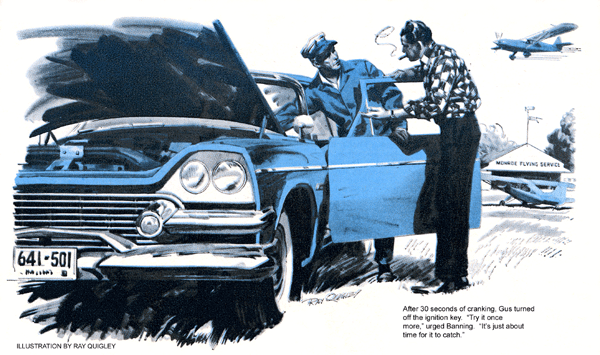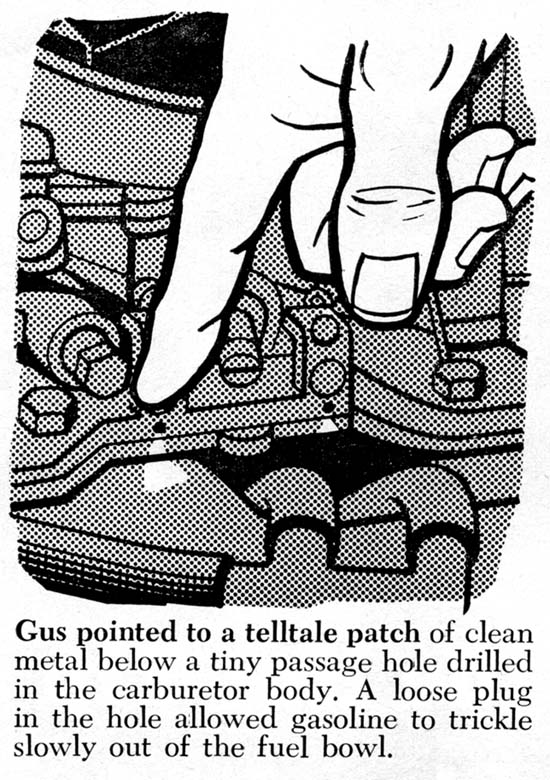October 1964
GUS TURNS
A KNOCK INTO A BOOST
by Martin Bunn

It was such a fine fall morning that Gus Wilson was reluctant to enter the Model Garage. He found his helper, Stan, hanging up the phone.
"Morning, Boss. We've got a dead-battery call from the county airport. The guy sounds as if he'll short-circuit unless we make the scene fast. Shall I go?"
Gus grinned. "Uh-uh. I feel like being out myself. Boss's privilege."
"OK". The name is Banning. He's waiting for you in the parking lot."
Making certain that a charged booster battery was aboard, Gus left in the wrecker. At the airport, he found a hatless, red-haired man pacing beside the car, cigarette stubs strewn in his path. He threw another away as Gus drove up, then handed over his keys.
Under the hood, Gus made certain that the battery clamps were tight. But turning the key only produced solenoid clicks.
"Haven't you got a helper battery?" asked Banning impatiently.
"Sure. But often what seems a dead battery is only a bad connection."
Banning snorted. "This isn't. It ran down cranking the engine. I flew back early on account of an emergency, so get me going fast any way you can."
Gus nodded. With the booster battery connected, the starter spun vigorously. But when 30 seconds of cranking produced not a pop, Gus turned off the key.
"It'll start," insisted Banning. "Just keep trying. The cars been standing here three days. It always takes a long time . . . "
Gus shrugged his shoulders and, against his better judgment, cranked again, with brief waits to let the starter cool.
"The engine isn't getting any gas," he said at last. If I keep on I'll run down my booster. Let me check the fuel system."
"Try it once more," urged Banning. "It's just about time for it to catch."
Gus flicked the key over again. The engine flashed abruptly into life.
"Does it always take that long to start?" asked Gus as he made out his bill.
"Only after the car's been standing a few days, when I go on trips."
"Cranking that long will run down any battery, especially if the car isn't used much," warned Gus. "Better have the engine checked before it happens again."
Banning grunted, paid, and drove off. It was the way most dead-battery calls ended, thought Gus as he headed back for the Model Garage. The driver was satisfied to get moving, without a thought for the underlying trouble. But he'd warned Banning. He wasn't responsible for a casual customer he would probably never see again. Gus breathed deeply of the crisp air and decided to forget it.
"It's a school problem," explained the principal on the phone. "But an unusual one. We need an expert witness. The boy involved suggests we ask you."
Gus looked out on the shop floor. Two urgent jobs had gone out. Stan could take care of anything else likely to come up.
"I can make it by four," agreed Gus.
The high school overlooked a huge parking lot, now almost empty. Gus was ushered into the office of the principal.
Jim Hunter, a tall balding man, rose from behind the desk. "Glad you could come," he said. "It seems you have a reputation that even our schoolboys respect."
"Also some curiosity," confessed Gus.
"We have an unfortunate teacher-student clash," explained the principal. "The student was warned he might fail his teacher's class. Last week he was driving his car in our parking lot before school -- cornering tests, he said. The teacher -- Mr. Stanton-had also come early and there was a near collision. I had to withdraw the boy's parking privileges for a month.
"Stanton's car, a new one, had given him some trouble. Yesterday the sales agency apparently corrected it. But last night he found the student doing something under the hood. The boy ran off. Driving away, the teacher found the car behaved as badly as before."
"I'm to find out whether the student could be responsible?" asked Gus.
"Yes. Unfortunately he refuses to explain what he was doing. But for a boy who lives alone -- his father is a widower, and away a lot -- Ted Banning has a good record. Here are the others now."
With an apologetic knock, a secretary had opened the door. She admitted a short, scowling man with a crew cut, a lanky red-haired youth, and the man Gus had met at the airport that morning.
"Now that we know each other," said Hunter after introductions, "tell Mr. Wilson about your car, Mr. Stanton."
The short man turned to Gus. "The engine hadn't been timed right. It pinged on the slightest acceleration, and idled unevenly. I took it back to the agency twice. The last time, two days ago, the mechanic set it with a timing light. It was perfectly fine until young Banning here tinkered with it, obviously in revenge for disciplinary action taken against him."
"It wasn't like that at all," the boy burst out.
"But you did have the hood up," said Hunter. "Will you explain why?"
Ted Banning's eyes went to Gus. "I will now. You wouldn't have understood.
"When Mr. Stanton drove uphill to the lot yesterday I heard the engine knocking, as if the spark was way advanced. I wondered why a new car should run so rough after the agency checked it twice -- I knew about that because my pal Jim Gaines told me. His father is a mechanic there."
"It chewed at me sort of -- you know?" The boys eyes asked for understanding. "And I'd never looked under the hood of this new model. Besides, I thought if I could spot what was wrong, like the distributor not being tight, or the points set too wide, or the spark advance weights stuck, maybe Mr. Stanton would be so glad he'd let me take a make-up test. But I guess that was crazy. He sure figured it different when he saw me."
Dr. Hunter looked at Gus, who nodded. "Any of those things Ted mentioned could over-advance the spark."
"What we want to know," put in Stanton, "is which of them he fooled with."
Banning Senior rose angrily to his feet.
"I'd like to see the car," said Gus hastily, and Hunter agreed.
All five trooped out to the parking lot. Stanton led them to a glistening new two-door of a popular make. Gus swung the hood up. The distributor setting, he found, was securely tightened. Mentally checking off the firing order, Gus traced each of the spark plug cables. None were cross-connected, though that was an easy way to bollix an engine.
"Want to hear it run?" offered Stanton.
Gus nodded. The teacher started the car, evidently with the throttle down, for it took off with a roar. Allowed to idle, it purred agreeably. Frowning, Stanton put it in gear, and with the brake on, slipped the clutch to load the engine.
"He must have undone whatever he did," declared Stanton. "It's all right now."
"Let it run," said Gus.
He advanced the throttle in short bursts. The engine rocked with each, then settled back. Suddenly its idle changed to a choppy, rough run.
"There!" shouted Stanton triumphantly."
"Does sound like the timing is off now," agreed Gus. "But Ted hasn't touched it."
Stanton's satisfaction underwent an almost comic transformation. At a sign from Gus he cut the engine. Gus snapped off the distributor cover. The breaker-point lock screw was tight. He reached in and pushed the centrifugal weights outward. They moved freely -- then snapped back more than he had moved them out.
In the light of a pocket flash he carried, Gus again moved the weights out. A small glossy brown fragment rolled out from under one. Another such piece gleamed darkly at the corner of the casing.
Gus straightened up.
"Ted had nothing to do with your trouble, Mr. Stanton -- and the agency did nothing to fix it. Have a look yourself."
Stanton took the flashlight and peered into the distributor. "There are some loose pieces. He could have put them there."
"What are they, Mr. Wilson?" asked the principal quietly.
"Bits of a broken rotor, which I hardly think Ted had handy. But his guess about stuck advance weights hit close. Whenever one of the loose pieces jammed the weights, they wouldn't fall back and the spark stayed advanced. The day the car was timed, they stayed out of the way."
Hunter nodded. "A random effect, which coincided with Ted's peek under the hood. I think we can close the case."
"Not quite!" snapped the elder Banning.
"Mr. Stanton may still claim that Ted put those pieces in. How else could they have got there, Mr. Wilson?"
Gus smiled. "Ever see an auto-assembly line? Somebody put on the rotor and snapped on the distributor cap. Maybe the rotor was defective. Maybe the cap wasn't seated right. When the engine was cranked the first time, that rotor broke. They took it out, but didn't fish out all the bits."
Hunter turned to the teacher. That clears Ted, Mr. Stanton, and I think he deserves that make-up test, don't you?
"Of course." A rueful smile came to the teacher's face. Guess I was much too touchy about my new car; and if Ted hadn't been curious I still wouldn't know what the trouble really was."
"We appreciate your help, Mr. Wilson," declared Hunter. "Send us your bill."
The teacher and the principal headed back toward the school building.
"You've earned our thanks, too," remarked Banning. I don't know how this would have turned out without you. Probably you're right about my car also. Okay if I bring it in tomorrow?"
"Well, now," said Gus, "something came to me about that slow starting of yours. Let's look at the engine right now."
Pausing to get his tool kit from his own car, Gus went to Banning's sedan. Ted had already raised the hood, waited with the eagerness of a spaniel.
Thoughtfully Gus inspected the big two-barrel carburetor, rubbed his finger on an area below the idle adjustment screws, and looked at it. "Dirty carburetor?" guessed Ted.
"Too clean," chuckled Gus. You know what that means?"
"A gas leak, huh?"
"But one so small it doesn't matter as long as the car is run daily. It's when it stands a few days that the leak empties the bowl. Then it takes a lot of cranking to get gas back up there."
"See these little holes? They're where the passages were drilled. Outside, they are plugged with soft lead shot. All we do is hammer it tighter." He set a small punch into each hole, rapped it lightly.
"You mean that's all there is to it? I won't have any more slow-starting trouble?" asked Banning.
"If you do, we'll fit new plugs. But don't forget to get your battery charged."
Banning handed Gus some money. "Never mind a bill. This is just to back up our thanks. After the way I acted at the airport, I wonder why you bothered to look at the car, let alone fix it."
Gus looked at Ted with a faint grin. "Well, it chewed at me sort of -- you know?"
Ted Banning's eyes, over an equally small but understanding smile, said he did.
END
